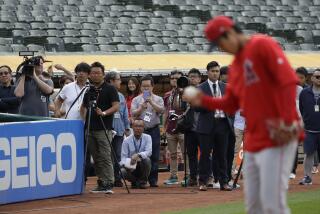Tokyo Expert Tells How U.S. Firms Fail in Japan
- Share via
American firms doing business in Japan demonstrate a lack of total commitment to that market by dispatching second-rate foreign managers to Tokyo and by hiring unqualified Japanese nationals, according to the president of Johnson & Johnson (Japan).
Masami Atarashi recently took American firms to task, criticizing their largely unsuccessful approach to Japan and advising them on how to make inroads there.
“To the extent you do your homework, a foreign company can be successful,” Atarashi told a recent gathering of U.S. and Japanese businessmen in Los Angeles. He is one of a growing number of Japanese executives who have taken an uncharacteristic high profile in admonishing American businesses about their poor showing in Japan.
Atarashi suggested ways that U.S.-based firms could take the offensive in the Japanese market. He described how small packaging and design changes for Johnson & Johnson products made significant differences in Japanese sales.
Since 1959, Atarashi, 53, has worked for Shell Oil Co., Coca-Cola (Japan), then joined Johnson & Johnson’s Japanese unit in Tokyo in 1978. He said American firms face five common problems in Japan:
- Absence of a corporate philosophy in the head office that spells out a “value system” for the entire company. “Typically,” he explained, “no corporate philosophy is communicated to the Japanese subsidiaries.”
- Ignorance in the head office. “American business executives have tended historically not to have much knowledge about Japan.”
- Poor foreign management. He said that American firms tend to assign to Japan second-class executives or those passed over in home-office politics--the “losers.”
- Frequent changes in top management because of short-term expectations for profit and sales. Atarashi advised that companies wait at least three years to evaluate an individual manager’s performance in Japan.
- Difficulty in attracting and maintaining high-caliber Japanese employees. “With the exception of IBM, foreign companies have had difficulty in keeping Japanese staff” because of compensation, management standards and opportunities for overseas experience.
“Japanese consumers are exceptionally demanding of product and packaging,” he explained. “You need to adapt a product (for the Japanese) regardless of its success in the home country.” Such adaptations should take into account the Japanese perceptions of value, appearance, availability and service.
When Johnson & Johnson introduced its Reach toothbrush in Japan in 1981, designers shortened it by 5 millimeters and gave it a thinner handle with a hook for hanging and offered three bristle types instead of two, as in the United States. The Japanese model came in a transparent package; the U.S. model was in a solid pack.
“We spent one year and significant money to make sure the product met specific needs,” Atarashi said of the Reach toothbrush, which has 9% of the $400-million toothbrush market in Japan and is the No. 1 seller in the premium toothbrush category.
More to Read
Inside the business of entertainment
The Wide Shot brings you news, analysis and insights on everything from streaming wars to production — and what it all means for the future.
You may occasionally receive promotional content from the Los Angeles Times.










